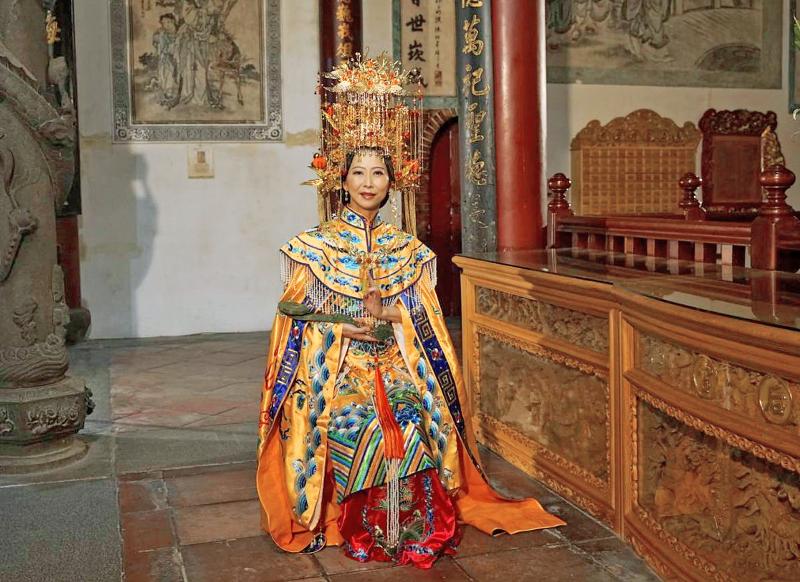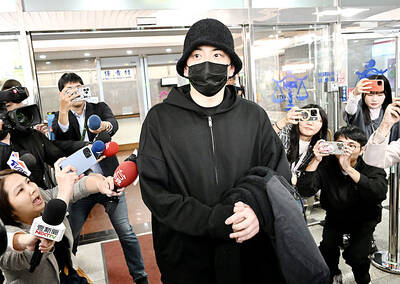Democratic Progressive Party (DPP) Legislator Chen Ting-fei (陳亭妃) yesterday said she has obtained broadcast regulators’ approval to play the sea goddess Matsu (媽祖) in a TV drama.
Chen wrote on Facebook that she and the production team of Formosa TV’s Taiwan New Mysteries had been granted approval from the National Communications Commission (NCC).
Local media reported that filming for the show earlier this week began at the Tainan Grand Matsu Temple (台南大天后宮).

Photo: Wang Mei-Hsiu, Taipei Times
Elected officials are subject to greater scrutiny when they appear in TV shows, which is as it should be, Chen said.
Before accepting the role, she consulted laws and regulations pertinent to the matter, Chen said.
Citing the commission’s approval, Chen said that politicians are allowed to appear in a drama as long as their role is not designed to boost their political career.
The commission highlighted that elected officials are barred from writing or editing a drama, she added.
Responding to criticism that she allegedly received preferential treatment from the commission, Chen said that her case is not comparable to that of Taichung Mayor Lu Shiow-yen (盧秀燕) of the Chinese Nationalist Party (KMT), who was on Aug. 30 fined NT$200,000 for a cameo in a separate TV show.
Lu played herself in the TVBS show Girl’s Power, while Chen has been cast to play a character different from her role as lawmaker, she said.
“There is no double standard,” Chen added.
The Taipei District Court has upheld Lu’s fine, saying that her appearance in the show in 2019 was intended to boost her as Taichung mayor and promote the Taichung Flora Expo.
Her role had been added to the script at a late stage of the writing process, it added.
In the finished script, the show’s protagonists incidentally meet Lu at their wedding and praise her for her good taste in men, which indicates that Lu’s appearance was intended to promote her as mayor, the court said.

The National Immigration Agency (NIA) said yesterday that it will revoke the dependent-based residence permit of a Chinese social media influencer who reportedly “openly advocated for [China’s] unification through military force” with Taiwan. The Chinese national, identified by her surname Liu (劉), will have her residence permit revoked in accordance with Article 14 of the “Measures for the permission of family- based residence, long-term residence and settlement of people from the Mainland Area in the Taiwan Area,” the NIA said in a news release. The agency explained it received reports that Liu made “unifying Taiwan through military force” statements on her online

A magnitude 5.7 earthquake struck off Taitung County at 1:09pm today, the Central Weather Administration (CWA) said. The hypocenter was 53km northeast of Taitung County Hall at a depth of 12.5km, CWA data showed. The intensity of the quake, which gauges the actual effect of a seismic event, measured 4 in Taitung County and Hualien County on Taiwan's seven-tier intensity scale, the data showed. The quake had an intensity of 3 in Nantou County, Chiayi County, Yunlin County, Kaohsiung and Tainan, the data showed. There were no immediate reports of damage following the quake.

Actor Darren Wang (王大陸) is to begin his one-year alternative military service tomorrow amid ongoing legal issues, the Ministry of the Interior said yesterday. Wang, who last month was released on bail of NT$150,000 (US$4,561) as he faces charges of allegedly attempting to evade military service and forging documents, has been ordered to report to Taipei Railway Station at 9am tomorrow, the Alternative Military Service Training and Management Center said. The 33-year-old would join about 1,300 other conscripts in the 263rd cohort of general alternative service for training at the Chenggong Ling camp in Taichung, a center official told reporters. Wang would first

MINOR DISRUPTION: The outage affected check-in and security screening, while passport control was done manually and runway operations continued unaffected The main departure hall and other parts of Terminal 2 at Taiwan Taoyuan International Airport lost power on Tuesday, causing confusion among passengers before electricity was fully restored more than an hour later. The outage, the cause of which is still being investigated, began at about midday and affected parts of Terminal 2, including the check-in gates, the security screening area and some duty-free shops. Parts of the terminal immediately activated backup power sources, while others remained dark until power was restored in some of the affected areas starting at 12:23pm. Power was fully restored at 1:13pm. Taoyuan International Airport Corp said in a